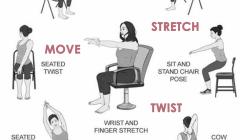Vitality recently announced their new partnership with Peppy, an expert personalised support service, to provide dedicated menopause support to its members*.
Going through menopause can be an extremely isolating and challenging time. This partnership provides a specific service to support Vitality members physically and mentally through the menopause, further reinforcing Vitality’s holistic approach to healthcare.
The hope for the future is that expert menopause support will be standard for all health insurance companies, but for now, Vitality are paving the way. This partnership offers support at the click of a button.
Women over 50 are the fastest growing workforce demographic in the UK** and whilst the average age for menopause is 51, symptoms can affect those who are much younger or older. In the UK, over 60 percent of people who go through menopause will experience symptoms at some stage and one in four*** will suffer severe, even debilitating symptoms that require adjustments to their life at home, and also in the workplace. Making the right medical and lifestyle changes can improve outcomes for cardiovascular, bone and mental health.
Vitality members will be able to access a wealth of resources through Peppy’s app-based digital health platform, to help them manage their symptoms, access expert advice and receive support from others also going through the menopause. They will have access to one-to-one text chat and phone or video consultations, as well as online webinars and exercise classes.
Through this new partnership, Vitality will also work with employers as part of its health insurance offering, to consider the potential debilitating effects of menopause on women, and the support they can offer to consider any potential impact on productivity, presenteeism and absenteeism.
What is menopause?
The menopause is a natural part of ageing that usually occurs between 45 and 55 years of age, as a woman’s oestrogen levels decline. In the UK, the average age for a woman to reach the menopause is 51.
The menopause is when a woman stops having periods and is no longer able to get pregnant naturally. Menopause occurs when a woman hasn’t menstruated in 12 consecutive months Periods usually start to become less frequent over a few months or years before they stop altogether. Sometimes they can stop suddenly.
But around 1 in 100 women experience the menopause before 40 years of age. This is known as premature menopause or premature ovarian insufficiency.
What causes the menopause?
The menopause is caused by a change in the balance of the body’s sex hormones, which occurs as you get older. It happens when your ovaries stop producing as much of the hormone oestrogen and no longer release an egg each month. Premature or early menopause can occur at any age, and in many cases there’s no clear cause.
Symptoms of the menopause
Most women will experience menopausal symptoms. Some of these can be quite severe and have a significant impact on your everyday activities. Common symptoms include:
| Hot Flushes | Night sweats |
| Vaginal dryness / discomfort during sex | Difficulty sleeping |
| Low mood / Anxiety | Reduced libido |
| Problems with memory | Lack of concentration |
Menopausal symptoms can begin months or even years before your periods stop and last around 4 years after your last period, although some women experience them for much longer.
Should I see a GP?
It’s worth talking to a GP if you have menopausal symptoms that are troubling you or if you’re experiencing symptoms of the menopause before 45 years of age.
What treatments are available for menopausal symptoms?
Your GP can offer treatments and suggest lifestyle changes if you have severe menopausal symptoms that interfere with your day-to-day life.
These include:
- Hormone Replacement Therapy (HRT) – tablets, skin patches, gels and implants that relieve menopausal symptoms by replacing oestrogen
- Vaginal oestrogen creams, lubricants or moisturisers for vaginal dryness
- Cognitive behavioural therapy (CBT) – a type of talking therapy that can help with low mood and anxiety
- Eating a healthy, balanced diet and exercising regularly – maintaining a healthy weight and staying fit and strong can improve some menopausal symptoms
* VitalityHealth members with a Personal Healthcare, Business Healthcare or Corporate Healthcare plan
** ONS Data 2018
*** Menopause research from NuffieldHealth, 2017



























